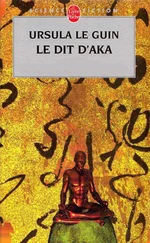I asked if the affairs on the wing sometimes resulted in children, and he said with indifference that of course they did. I pressed him a little about it, and he said that a baby was a great bother to a flying mother, so that as soon as it was weaned it was usually left “on the ground,” as he put it, to be brought up by relatives. Sometimes the winged mother got so attached to the childjthat she grounded herself to look after it. He told me this with some disdain.
The children of fliers are no more likely to grow wings than other children. The phenomenon has no genetic factor but is a developmental pathology shared by all Gyr, which appears in less than one out of a thousand.
I think Ardiadia would not accept the word pathology.
I talked also with a nonflying winged Gyr, who let me record our conversation but asked that I not use his name. He is a member of a respectable law firm in a small city in Central Gy.
He said, “I never flew, no. I was twenty when I got sick. I’d thought I was past the age, safe. It was a terrible blow. My parents had already spent a good deal of money, made sacrifices to get me into college. I was doing well in college. I liked learning. I had an intellect. To lose a year was bad enough. I wasn’t going to let this business eat up my whole life. To me the wings are simply excrescences. Growths. Impediments to walking, dancing, sitting in a civilised manner on a normal chair, wearing decent clothing. I refused to let something like that get in the way of my education, my life. Fliers are stupid, their brains go all to feathers. I wasn’t going to trade in my mind for a chance to flitter about over rooftops. I’m more interested in what goes on under the roofs. I don’t care for scenery. I prefer people. And I wanted a normal life. I wanted to marry, to have children. My father was a kind man; he died when I was sixteen, and I’d always thought that if I could be as good to my children as he was to us, it would be a way of thanking him, of honoring his memory… I was fortunate enough to meet a beautiful woman who refused to let my handicap frighten her. In fact she won’t let me call it that. She insists that all this”—he indicated his wings with a slight gesture of his head—“was what she first saw in me. Claims that when we first met, she thought I was quite a boring, stuffy young fellow, till I turned around.”
His head feathers were black with a blue crest. His wings, though flattened, bound, and belted down, as nonfliers’ wings always are, to keep them out of the way and as unnoticeable as possible, were splendidly feathered in patterns of dark blue and peacock blue with black bars and edges.
“At any rate, I was determined to keep my feet on the ground, in every sense. If I’d ever had any youthful notions about flitting off for a while, which I really never did, once I was through with the fever and delirium and had made peace with the whole painful, wasteful process—if I had ever thought of flying, once I was married, once we had a child, nothing, nothing could induce me to yearn for even a taste of that life, to consider it even for a moment. The utter irresponsibility of it, the arrogance—the arrogance of it is very distasteful to me.”
We then talked for some time about his law practice, which was an admirable one, devoted to representing poor people against swindlers and profiteers. He showed me a charming portrait of his two children, eleven and nine years old, which he had drawn with one of his own quills. The chances that either child would grow wings was, as for every Gyr, a thousand to one.
Shortly before I left, I asked him, “Do you ever dream of flying?”
Lawyerlike, he was slow to answer. He looked away, out the window. “Doesn’t everyone?” he said.
THE ISLAND OF THE IMMORTALS
SOMEBODY ASKED ME if I’d heard that there were immortal people on the Yendian plane, and somebody else told me that there were, so when I got there, I asked about them. The travel agent rather reluctantly showed me on her map a place called the Island of the Immortals. “You don’t want to go there,” she said.
“I don’t?”
“Well, it’s dangerous,” she said, looking at me as if she thought I was not the danger-loving type, in which she was entirely correct. She was a rather unpolished local agent, not an employee of the Interplanary Service. Yendi is not a popular destination. In many ways it’s so like our own plane that it seems hardly worth the trouble of visiting. There are differences, but they’re subtle.
“Why is it called the Island of the Immortals?”
“Because some of the people there are immortal.”
“They don’t die?” I asked, never quite sure of the accuracy of my translatomat.
“They don’t die,” she said indifferently. “Now, the Prinjo Archipelago is a lovely place for a restful fortnight.” Her pencil moved southward across the map of the Great Sea of Yendi. My gaze remained on the large, lonely Island of the Immortals. I pointed to it.
“Is there a hotel—there?”
“There are no tourist facilities. Just cabins for the diamond hunters.”
“There are diamond mines?”
“Probably,” she said. She had become dismissive.
“What makes it dangerous?”
“The flies.”
“Biting flies? Do they carry disease?”
“No.” She was downright sullen by now.
“I’d like to try it for a few days,” I said, as winningly as I could. “Just to find out if I’m brave. If I get scared, I’ll come right back. Give me an open flight back.”
“No airport.”
“Ah,” said I, more winningly than ever. “So how would I get there?”
“Ship,” she said, unwon. “Once a week.”
Nothing rouses an attitude like an attitude. “Fine!” I said.
At least, I thought as I left the travel agency, it won’t be anything like Laputa. I had read Gulliver’s Travels as a child, in a slightly abridged and probably greatly expurgated version. My memory of it was like all my childhood memories, immediate, broken, vivid—bits of bright particularity in a vast drift of oblivion. I remembered that Laputa floated in the air, so you had to use an airship to get to it. And really I remembered little else, except that the Laputans were immortal, and that I had liked it the least of Gulliver’s four travels, deciding it was for grown-ups, a damning quality at the time. Did the Laputans have spots, moles, something like that, which distinguished them? And were they scholars? But they grew senile, and lived on and on in incontinent idiocy—or did I imagine that? There was something nasty about them, something like that, something for grown-ups.
But I was on Yendi, where Swift’s works were not in the library. I could not look it up. Instead, since I had a whole day before the ship sailed, I went to the library and looked up the Island of the Immortals.
The Central Library of Undund is a noble old building fьll of modern conveniences, including legemats. I asked a librarian for assistance and he brought me Postwand’s Explorations, written about a hundred and sixty years earlier, from which I copied what follows. At the time Postwand wrote, the port city where I was staying, An Ria, had not been founded; the great wave of settlers from the east had not begun; the peoples of the coast were scattered tribes of shepherds and farmers. Postwand took a rather patronising but intelligent interest in their stories.
“Among the legends of the peoples of the West Coast,” he writes, “one concerned a large island two or three days west from Undund Bay, where live the people who never die. All whom I asked about it were familiar with the reputation of the Island of the Immortals, and some even told me that members of their tribe had visited the place. Impressed with the unanimity of this tale, I determined to test its veracity. When at length Vong had finished making repairs to my boat, I sailed out of the Bay and due west over the Great Sea. A following wind favored my expedition.
Читать дальше









